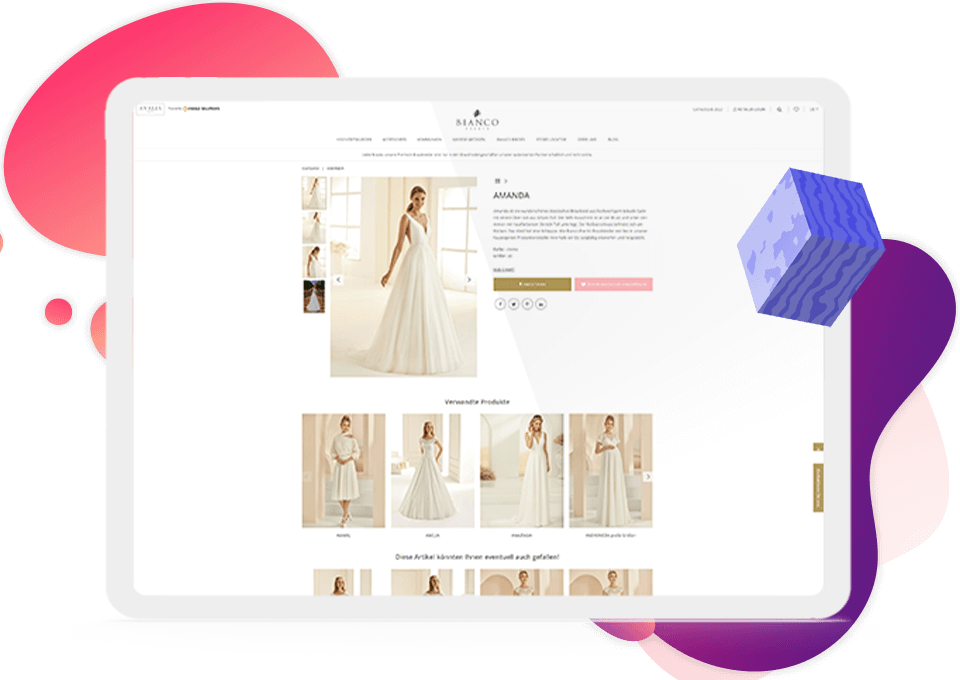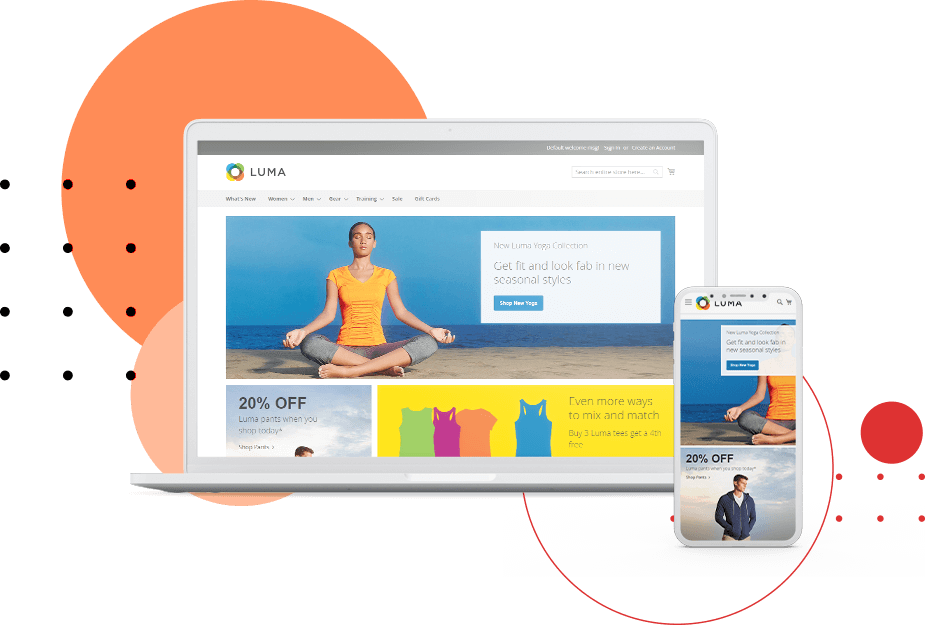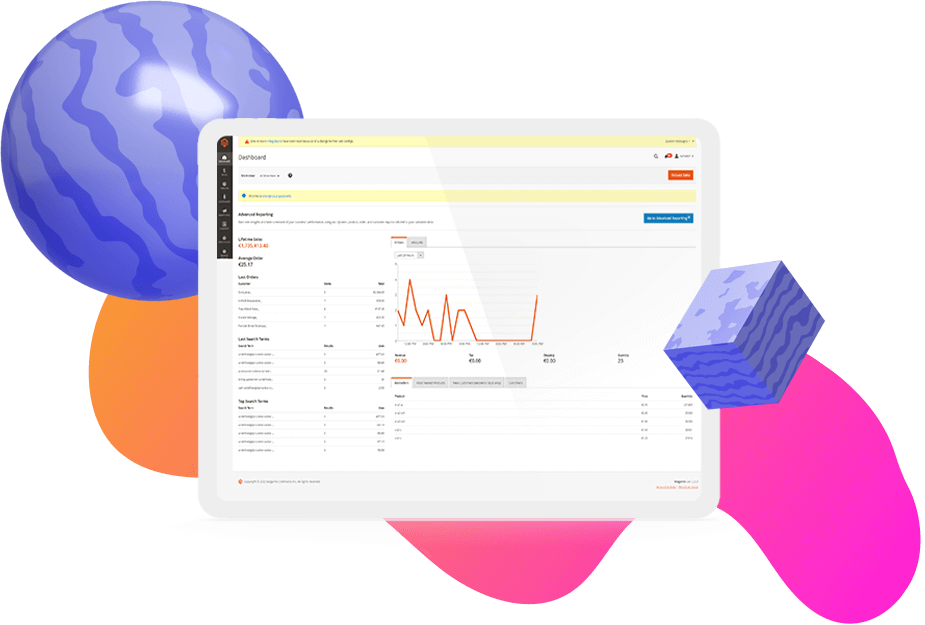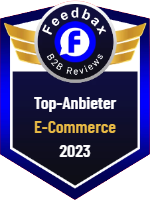- SAP Business One
- Online Shop & Web Design
- IT & Cloud
- Digital Marketing
- References
- About Us
Personalise B2B shopping experience with us!
B2B ecommerce exists in a perpetual state of rapid evolution and if you’re a manufacturer, wholesaler or distributor, you need more than a rigid, standardised B2B strategy to keep up. You need a flexible and intelligent solution to seize opportunities with up-and-coming channels and business models to meet the high demands of your buyers and AI-powered customisation to engage with new markets on a personal level.
Now you can offer it. Specifically designed for the B2B buyer, Adobe Commerce’s integrated B2B capabilities let your customers self-manage their company accounts. Through an easy-to-use customer portal, they can set up multiple tiers of buyers with specific roles and permissions, track quotes and orders, define purchase approval rules and manage their credit online — making day-to-day management tasks fast and efficient for your customers.
The buying experience is personalised with customer-specific catalogues and pricing and targeted content and promotions. Convenience is at the core with quick order forms and the ability to upload lists of SKUs, create saved shopping lists or request quotes any time. Seller assisted shopping takes it a step further, letting you place orders on behalf of customers or troubleshoot issues — making the buying experience frictionless and helping you garner loyalty and sustain business growth.
What you’ll learn:
The lines between B2B and B2C are blurring. Markets are quickly changing and customers in the current climate, whether retail, distributor or wholesale, demand more from a business than just products.
Experience is essential. From streamlined, personalised shopping on a slick, intuitive eCommerce window, to tailored communications and exclusive treatment from a brand. Customers expect a lot.
Meet these demands with an integrated B2B eCommerce solution - the blending of CRM and online shop into one data-rich, customer-centric, future-proof platform.

Rich, personalized experiences
Drag-and-drop merchandising tools, customer-specific catalogs and pricing, and targeted content and product recommendations make it easy to create personalized experiences without IT help.
Quote management and price negotiations
Integrated customer quoting and price negotiation capabilities improve conversion. The streamlined quote request workflow can be entirely managed within our solution or though external systems using APIs.
Convenient account management
Self-service portals let your customers access invoices, order history, and company credit, as well as manage buyers and permissions.
Agility to adapt
A single system lets you manage both B2B and B2C businesses and sell to multiple sites and brands in multiple geographies. You also have the flexibility to sell digital goods, services, and subscriptions.
Friction free order
Buyers can quickly place orders by entering SKUs, uploading CSV files, or choosing from preset requisition lists, as well as purchase on credit and set approval rules to ensure compliance. Assisted selling enables easy order creation and troubleshooting.
Effortless Integration
Easily extend the platform and integrate with existing business systems using our robust library of APIs and thousands of off-the-shelf extensions including options for punchout purchasing and enterprise marketplaces.

So, what should you expect from a B2B eCommerce platform? Any platform needs to be feature-rich and make the retail process easier for both you and your customers across front and back-end.
With a solid platform as your base, you can automate much of the customer retail process, meaning you’ll have more time for marketing your brand and expanding your business.
B2B eCommerce features your platform should have include:
Use data to identify insights and trends in your customer behaviour. By monitoring your eCommerce window, you can turn customer browsing and purchase data to your advantage. Understand what’s popular and know your customers to turn that information into fuel to grow your offering.
Target former customers and new prospects with tailored marketing collateral, promotional offers and more. An automated marketing system enables you to reach the people that matter most, with content that is useful and worthwhile.
A good eCommerce platform will make the order process seamless. Consider whether your platform will offer on-hand support to your B2B buyers via e-chat sales reps or a chatbot.
It’s essential that your platform has a method of tracking orders from when they first enter the funnel - provide full order, quote and invoice tracking for you and your customer’s records.
One B2B eCommerce feature that is essential to is a scalable, cloud-based support system for your site. More cost-effective than hosting your eCommerce platform yourself, cloud-based support provides better foundations upon which to build your online business window.
The right platform will allow you to deal with higher traffic numbers or a vast catalog of products – numbers that would slow and crash any personally hosted offering.
Tailor your customer communications through a personalised customer management tool. Building long-lasting relationships is key to a business’ success - happy customers are more likely to convert, after all.
Personalisation sets you apart from the competition and makes customers feel valued. Use a customer management feature to tailor the shopping experience to an individual shopper to provide each customer with exactly what they need, every time.
Customers expect your brand to be everywhere, from your website hub to customer interactions and support on social media. An integrated eCommerce platform will help you to manage your omnichannel presence with ease, automating where you can. And if you market globally, you’ll likely need multi-national site offerings or language support, which a leading eCommerce solution will provide.
Plus, you can manage and edit pages and products across multiple sites in one place. So, the next time you need to raise a product price, there’s no manual editing across multi-nation pages.
Getting your eCommerce platform up and running will take just a few quick and easy steps.

Adobe Commerce, powered by Magento can be set-up with just a few clicks, so it’s important to make sure that the physical elements of your business are ready-to-go in time for launch. Check stock levels, product range and that staff are trained before you hit go.

You’ll want to spread the word about your new eCommerce shop window. Marketing and promotion is essential for letting prospects and leads know about your products. Generate ideas for a marketing strategy across your channels and put some budget behind making sure as many people as possible can be reached by your launch.
Adobe Commerce, powered by Magento is an out-of-the-box support platform that provides a superior shopping experience for you and your customers.
To learn how you can make the most of Adobe Commerce, powered by Magento, request a personal consultation.

eCommerce integration is the combining of your customer-facing eCommerce platform and your back-end inventory and data management tool. By integrating your online store with your CRM, you’ll be making it easier to monitor and update stock lists, fast-track product changes and automate post-purchase customer comms.
An integrated platform means stock lists are monitored in real-time by an amalgamated CRM linked into your eCommerce purchase window. Customer comms, like real-time delivery information, can be set up and sent by an intelligent data-rich system.

B2B, or Business to Business, is the act of selling products to other professionals. B2C, Business to Consumer, is selling to individuals.
In today’s modern marketplace, the line between the two is often blurred. And with a strong eCommerce platform, you can combine both revenue streams into a centrally-managed storefront.
Not sure if you have found the right service? No worries, we are here to assist! Just enter your email address to request a free initial consultation.
For inquiries or requests, we will make every attempt to respond within 48 hours or call us at +49 30 863 232 940
 Applicable for Package
Applicable for Package Optional
Optional
 Applicable for Package Applicable for Package Optional Optional |
Basic
300 €
|
Standard
1200 €
|
Plus
1900 €
|
Professional
2900 €
|
|---|---|---|---|---|
|
Company Database with basic settings
|
 |
 |
 |
 |
|
Standard Layouts with individual Logo and customization of the footer
|
 |
 |
 |
 |
|
Outlook Add-on Integration (5 users included)
|
 |
 |
 |
 |
| Reporting and analytics |  |
 |
 |
 |
| Access to Test Demo Database |  |
 |
 |
 |
| Web Client Activation |  |
 |
 |
 |
| Customization - Simple User Defined Fields (UDF) and User Define Tables (UDT) |  |
 |
 |
 |
|
Configuration of SAP Mobile App
|
 |
 |
 |
 |
|
Company Database with basic settings
|
 |
|
Standard Layouts with individual Logo and customization of the footer
|
 |
|
Outlook Add-on Integration (5 users included)
|
 |
| Reporting and analytics |  |
| Access to Test Demo Database |  |
| Web Client Activation |  |
| Customization - Simple User Defined Fields (UDF) and User Define Tables (UDT) |  |
|
Configuration of SAP Mobile App
|
 |
|
Company Database with basic settings
|
 |
|
Standard Layouts with individual Logo and customization of the footer
|
 |
|
Outlook Add-on Integration (5 users included)
|
 |
| Reporting and analytics |  |
| Access to Test Demo Database |  |
| Web Client Activation |  |
| Customization - Simple User Defined Fields (UDF) and User Define Tables (UDT) |  |
|
Configuration of SAP Mobile App
|
 |
|
Company Database with basic settings
|
 |
|
Standard Layouts with individual Logo and customization of the footer
|
 |
|
Outlook Add-on Integration (5 users included)
|
 |
| Reporting and analytics |  |
| Access to Test Demo Database |  |
| Web Client Activation |  |
| Customization - Simple User Defined Fields (UDF) and User Define Tables (UDT) |  |
|
Configuration of SAP Mobile App
|
 |
|
Company Database with basic settings
|
 |
|
Standard Layouts with individual Logo and customization of the footer
|
 |
|
Outlook Add-on Integration (5 users included)
|
 |
| Reporting and analytics |  |
| Access to Test Demo Database |  |
| Web Client Activation |  |
| Customization - Simple User Defined Fields (UDF) and User Define Tables (UDT) |  |
|
Configuration of SAP Mobile App
|
 |
 Applicable for Package
Applicable for Package Optional
Optional
 Applicable for Package Applicable for Package Optional Optional |
Standard
1200 €
|
Plus
1900 €
|
Professional
2900 €
|
|---|---|---|---|
| Predefined COA SKR03/SKR04 |  |
 |
 |
| Multiple Currencies |  |
 |
 |
| Setup of GL Account Determination |  |
 |
 |
| Set up of Tax Codes |  |
 |
 |
| Budgeting |  |
 |
 |
|
Cost Accounting
|
 |
 |
 |
|
Elster Configuration and processing
|
 |
 |
 |
| DATEV Configuration and Export |  |
 |
 |
| Assitance in applying SEPA Creditor Number |  |
 |
 |
| Financial Reports Setup |  |
 |
 |
| Fixed Assets Intialization and master setup |  |
 |
 |
|
INTRASTAT Configuration
|
 |
 |
 |
| Predefined COA SKR03/SKR04 |  |
| Multiple Currencies |  |
| Setup of GL Account Determination |  |
| Set up of Tax Codes |  |
| Budgeting |  |
|
Cost Accounting
|
 |
|
Elster Configuration and processing
|
 |
| DATEV Configuration and Export |  |
| Assitance in applying SEPA Creditor Number |  |
| Financial Reports Setup |  |
| Fixed Assets Intialization and master setup |  |
|
INTRASTAT Configuration
|
 |
| Predefined COA SKR03/SKR04 |  |
| Multiple Currencies |  |
| Setup of GL Account Determination |  |
| Set up of Tax Codes |  |
| Budgeting |  |
|
Cost Accounting
|
 |
|
Elster Configuration and processing
|
 |
| DATEV Configuration and Export |  |
| Assitance in applying SEPA Creditor Number |  |
| Financial Reports Setup |  |
| Fixed Assets Intialization and master setup |  |
|
INTRASTAT Configuration
|
 |
| Predefined COA SKR03/SKR04 |  |
| Multiple Currencies |  |
| Setup of GL Account Determination |  |
| Set up of Tax Codes |  |
| Budgeting |  |
|
Cost Accounting
|
 |
|
Elster Configuration and processing
|
 |
| DATEV Configuration and Export |  |
| Assitance in applying SEPA Creditor Number |  |
| Financial Reports Setup |  |
| Fixed Assets Intialization and master setup |  |
|
INTRASTAT Configuration
|
 |
 Applicable for Package
Applicable for Package Optional
Optional
 Applicable for Package Applicable for Package Optional Optional |
Standard
1200 €
|
Plus
1900 €
|
Professional
2900 €
|
|---|---|---|---|
|
Banks Setup
|
 |
 |
 |
|
Electronic Transactions
|
 |
 |
 |
|
Bank Statement Processing
|
 |
 |
 |
|
Payment Engine Add-on
|
 |
 |
 |
|
Banks Setup
|
 |
|
Electronic Transactions
|
 |
|
Bank Statement Processing
|
 |
|
Payment Engine Add-on
|
 |
|
Banks Setup
|
 |
|
Electronic Transactions
|
 |
|
Bank Statement Processing
|
 |
|
Payment Engine Add-on
|
 |
|
Banks Setup
|
 |
|
Electronic Transactions
|
 |
|
Bank Statement Processing
|
 |
|
Payment Engine Add-on
|
 |
 Applicable for Package
Applicable for Package Optional
Optional
 Applicable for Package Applicable for Package Optional Optional |
Standard
1200 €
|
Plus
1900 €
|
Professional
2900 €
|
|---|---|---|---|
| Vendor Groups |  |
 |
 |
| Landed Costs |  |
 |
 |
| Freight |  |
 |
 |
| Vendor Groups |  |
| Landed Costs |  |
| Freight |  |
| Vendor Groups |  |
| Landed Costs |  |
| Freight |  |
| Vendor Groups |  |
| Landed Costs |  |
| Freight |  |
 Applicable for Package
Applicable for Package Optional
Optional
 Applicable for Package Applicable for Package Optional Optional |
Standard
1200 €
|
Plus
1900 €
|
Professional
2900 €
|
|---|---|---|---|
|
CRM with lead management, contacts
|
 |
 |
 |
| Sales Employee |  |
 |
 |
| Dunning Terms |  |
 |
 |
|
CRM with lead management, contacts
|
 |
| Sales Employee |  |
| Dunning Terms |  |
|
CRM with lead management, contacts
|
 |
| Sales Employee |  |
| Dunning Terms |  |
|
CRM with lead management, contacts
|
 |
| Sales Employee |  |
| Dunning Terms |  |
 Applicable for Package
Applicable for Package Optional
Optional
 Applicable for Package Applicable for Package Optional Optional |
Standard
1200 €
|
Plus
1900 €
|
Professional
2900 €
|
|---|---|---|---|
|
Warehouse Management with locations, batches and serial numbers
|
 |
 |
 |
| Item Groups |  |
 |
 |
| Item Properties |  |
 |
 |
| Unit of Measure and UoM Groups Setup |  |
 |
 |
| Weight, Length and Width Setup |  |
 |
 |
| Manufacturer |  |
 |
 |
| Shipping Types |  |
 |
 |
| Inventory Cycle |  |
 |
 |
| Package Types |  |
 |
 |
|
Warehouse Management with locations, batches and serial numbers
|
 |
| Item Groups |  |
| Item Properties |  |
| Unit of Measure and UoM Groups Setup |  |
| Weight, Length and Width Setup |  |
| Manufacturer |  |
| Shipping Types |  |
| Inventory Cycle |  |
| Package Types |  |
|
Warehouse Management with locations, batches and serial numbers
|
 |
| Item Groups |  |
| Item Properties |  |
| Unit of Measure and UoM Groups Setup |  |
| Weight, Length and Width Setup |  |
| Manufacturer |  |
| Shipping Types |  |
| Inventory Cycle |  |
| Package Types |  |
|
Warehouse Management with locations, batches and serial numbers
|
 |
| Item Groups |  |
| Item Properties |  |
| Unit of Measure and UoM Groups Setup |  |
| Weight, Length and Width Setup |  |
| Manufacturer |  |
| Shipping Types |  |
| Inventory Cycle |  |
| Package Types |  |
 Applicable for Package
Applicable for Package Optional
Optional
 Applicable for Package Applicable for Package Optional Optional |
Standard
1200 €
|
Plus
1900 €
|
Professional
2900 €
|
|---|---|---|---|
| Address format setup |  |
 |
 |
| Country Setup |  |
 |
 |
| Payment Terms |  |
 |
 |
| Address format setup |  |
| Country Setup |  |
| Payment Terms |  |
| Address format setup |  |
| Country Setup |  |
| Payment Terms |  |
| Address format setup |  |
| Country Setup |  |
| Payment Terms |  |
 Im Plan enthalten
Im Plan enthalten Optional
Optional
 Im Plan enthalten Im Plan enthalten Optional Optional |
Basic
300 €
|
Standard
1200 €
|
Plus
1900 €
|
Professional
2900 €
|
|---|---|---|---|---|
|
Firmendatenbank (Grundeinstellung)
|
 |
 |
 |
 |
|
Standard-Belege, mit individuellem Logo und Anpassung der Fußzeile
|
 |
 |
 |
 |
|
Integration des Outlook-Add-ons (für 5 Benutzer inbegriffen)
|
 |
 |
 |
 |
| Berichtswesen und Analysen |  |
 |
 |
 |
| Zugang zur Test-Demodatenbank |  |
 |
 |
 |
| Web-Client-Aktivierung |  |
 |
 |
 |
| Anpassung - Einfache benutzerdefinierte Felder (UDF) und benutzerdefinierte Tabellen (UDT) |  |
 |
 |
 |
|
Konfiguration der SAP Mobile App
|
 |
 |
 |
 |
|
Firmendatenbank (Grundeinstellung)
|
 |
|
Standard-Belege, mit individuellem Logo und Anpassung der Fußzeile
|
 |
|
Integration des Outlook-Add-ons (für 5 Benutzer inbegriffen)
|
 |
| Berichtswesen und Analysen |  |
| Zugang zur Test-Demodatenbank |  |
| Web-Client-Aktivierung |  |
| Anpassung - Einfache benutzerdefinierte Felder (UDF) und benutzerdefinierte Tabellen (UDT) |  |
|
Konfiguration der SAP Mobile App
|
 |
|
Firmendatenbank (Grundeinstellung)
|
 |
|
Standard-Belege, mit individuellem Logo und Anpassung der Fußzeile
|
 |
|
Integration des Outlook-Add-ons (für 5 Benutzer inbegriffen)
|
 |
| Berichtswesen und Analysen |  |
| Zugang zur Test-Demodatenbank |  |
| Web-Client-Aktivierung |  |
| Anpassung - Einfache benutzerdefinierte Felder (UDF) und benutzerdefinierte Tabellen (UDT) |  |
|
Konfiguration der SAP Mobile App
|
 |
|
Firmendatenbank (Grundeinstellung)
|
 |
|
Standard-Belege, mit individuellem Logo und Anpassung der Fußzeile
|
 |
|
Integration des Outlook-Add-ons (für 5 Benutzer inbegriffen)
|
 |
| Berichtswesen und Analysen |  |
| Zugang zur Test-Demodatenbank |  |
| Web-Client-Aktivierung |  |
| Anpassung - Einfache benutzerdefinierte Felder (UDF) und benutzerdefinierte Tabellen (UDT) |  |
|
Konfiguration der SAP Mobile App
|
 |
|
Firmendatenbank (Grundeinstellung)
|
 |
|
Standard-Belege, mit individuellem Logo und Anpassung der Fußzeile
|
 |
|
Integration des Outlook-Add-ons (für 5 Benutzer inbegriffen)
|
 |
| Berichtswesen und Analysen |  |
| Zugang zur Test-Demodatenbank |  |
| Web-Client-Aktivierung |  |
| Anpassung - Einfache benutzerdefinierte Felder (UDF) und benutzerdefinierte Tabellen (UDT) |  |
|
Konfiguration der SAP Mobile App
|
 |
 Im Plan enthalten
Im Plan enthalten Optional
Optional
 Im Plan enthalten Im Plan enthalten Optional Optional |
Standard
1200 €
|
Plus
1900 €
|
Professional
2900 €
|
|---|---|---|---|
| Vorgefertigter Kontenplan SKR03/SKR04 |  |
 |
 |
| Mehrere Währungen |  |
 |
 |
| Einrichtung der Sachkontenfindung |  |
 |
 |
| Einrichtung von Steuerkennzeichen |  |
 |
 |
| Budgetierung |  |
 |
 |
|
Kostenrechnung
|
 |
 |
 |
|
Elster-Konfiguration und -Verarbeitung
|
 |
 |
 |
| DATEV-Konfiguration und Export |  |
 |
 |
| Unterstützung bei Beantragung einer SEPA-Gläubiger-Nummer |  |
 |
 |
| Einrichtung von Finanzberichten |  |
 |
 |
| Initialisierung und Stammeinrichtung von Anlagevermögen |  |
 |
 |
|
INTRASTAT-Konfiguration
|
 |
 |
 |
| Vorgefertigter Kontenplan SKR03/SKR04 |  |
| Mehrere Währungen |  |
| Einrichtung der Sachkontenfindung |  |
| Einrichtung von Steuerkennzeichen |  |
| Budgetierung |  |
|
Kostenrechnung
|
 |
|
Elster-Konfiguration und -Verarbeitung
|
 |
| DATEV-Konfiguration und Export |  |
| Unterstützung bei Beantragung einer SEPA-Gläubiger-Nummer |  |
| Einrichtung von Finanzberichten |  |
| Initialisierung und Stammeinrichtung von Anlagevermögen |  |
|
INTRASTAT-Konfiguration
|
 |
| Vorgefertigter Kontenplan SKR03/SKR04 |  |
| Mehrere Währungen |  |
| Einrichtung der Sachkontenfindung |  |
| Einrichtung von Steuerkennzeichen |  |
| Budgetierung |  |
|
Kostenrechnung
|
 |
|
Elster-Konfiguration und -Verarbeitung
|
 |
| DATEV-Konfiguration und Export |  |
| Unterstützung bei Beantragung einer SEPA-Gläubiger-Nummer |  |
| Einrichtung von Finanzberichten |  |
| Initialisierung und Stammeinrichtung von Anlagevermögen |  |
|
INTRASTAT-Konfiguration
|
 |
| Vorgefertigter Kontenplan SKR03/SKR04 |  |
| Mehrere Währungen |  |
| Einrichtung der Sachkontenfindung |  |
| Einrichtung von Steuerkennzeichen |  |
| Budgetierung |  |
|
Kostenrechnung
|
 |
|
Elster-Konfiguration und -Verarbeitung
|
 |
| DATEV-Konfiguration und Export |  |
| Unterstützung bei Beantragung einer SEPA-Gläubiger-Nummer |  |
| Einrichtung von Finanzberichten |  |
| Initialisierung und Stammeinrichtung von Anlagevermögen |  |
|
INTRASTAT-Konfiguration
|
 |
 Im Plan enthalten
Im Plan enthalten Optional
Optional
 Im Plan enthalten Im Plan enthalten Optional Optional |
Standard
1200 €
|
Plus
1900 €
|
Professional
2900 €
|
|---|---|---|---|
|
Banken
|
 |
 |
 |
|
Elektronischer Zahlungsverkehr
|
 |
 |
 |
|
Kontoauszungsverarbeitung
|
 |
 |
 |
|
Payment Engine Add-on
|
 |
 |
 |
|
Banken
|
 |
|
Elektronischer Zahlungsverkehr
|
 |
|
Kontoauszungsverarbeitung
|
 |
|
Payment Engine Add-on
|
 |
|
Banken
|
 |
|
Elektronischer Zahlungsverkehr
|
 |
|
Kontoauszungsverarbeitung
|
 |
|
Payment Engine Add-on
|
 |
|
Banken
|
 |
|
Elektronischer Zahlungsverkehr
|
 |
|
Kontoauszungsverarbeitung
|
 |
|
Payment Engine Add-on
|
 |
 Im Plan enthalten
Im Plan enthalten Optional
Optional
 Im Plan enthalten Im Plan enthalten Optional Optional |
Standard
1200 €
|
Plus
1900 €
|
Professional
2900 €
|
|---|---|---|---|
| Lieferantengruppen |  |
 |
 |
| Wareneinstandspreise |  |
 |
 |
| Fracht |  |
 |
 |
| Lieferantengruppen |  |
| Wareneinstandspreise |  |
| Fracht |  |
| Lieferantengruppen |  |
| Wareneinstandspreise |  |
| Fracht |  |
| Lieferantengruppen |  |
| Wareneinstandspreise |  |
| Fracht |  |
 Im Plan enthalten
Im Plan enthalten Optional
Optional
 Im Plan enthalten Im Plan enthalten Optional Optional |
Standard
1200 €
|
Plus
1900 €
|
Professional
2900 €
|
|---|---|---|---|
|
Vertrieb
|
 |
 |
 |
| Vertriebsmitarbeiter-Einrichtung |  |
 |
 |
| Mahnbedingungen |  |
 |
 |
|
Vertrieb
|
 |
| Vertriebsmitarbeiter-Einrichtung |  |
| Mahnbedingungen |  |
|
Vertrieb
|
 |
| Vertriebsmitarbeiter-Einrichtung |  |
| Mahnbedingungen |  |
|
Vertrieb
|
 |
| Vertriebsmitarbeiter-Einrichtung |  |
| Mahnbedingungen |  |
 Im Plan enthalten
Im Plan enthalten Optional
Optional
 Im Plan enthalten Im Plan enthalten Optional Optional |
Standard
1200 €
|
Plus
1900 €
|
Professional
2900 €
|
|---|---|---|---|
|
Lagerverwaltung mit Standorten, Chargen und Seriennummern
|
 |
 |
 |
| Artikelgruppen |  |
 |
 |
| Artikeleigenschaften |  |
 |
 |
| Einrichtung von Maßeinheiten und UoM-Gruppen |  |
 |
 |
| Einrichtung von Gewicht, Länge und Breite |  |
 |
 |
| Hersteller |  |
 |
 |
| Versandarten |  |
 |
 |
| Inventurzyklus |  |
 |
 |
| Verpackungsarten |  |
 |
 |
|
Lagerverwaltung mit Standorten, Chargen und Seriennummern
|
 |
| Artikelgruppen |  |
| Artikeleigenschaften |  |
| Einrichtung von Maßeinheiten und UoM-Gruppen |  |
| Einrichtung von Gewicht, Länge und Breite |  |
| Hersteller |  |
| Versandarten |  |
| Inventurzyklus |  |
| Verpackungsarten |  |
|
Lagerverwaltung mit Standorten, Chargen und Seriennummern
|
 |
| Artikelgruppen |  |
| Artikeleigenschaften |  |
| Einrichtung von Maßeinheiten und UoM-Gruppen |  |
| Einrichtung von Gewicht, Länge und Breite |  |
| Hersteller |  |
| Versandarten |  |
| Inventurzyklus |  |
| Verpackungsarten |  |
|
Lagerverwaltung mit Standorten, Chargen und Seriennummern
|
 |
| Artikelgruppen |  |
| Artikeleigenschaften |  |
| Einrichtung von Maßeinheiten und UoM-Gruppen |  |
| Einrichtung von Gewicht, Länge und Breite |  |
| Hersteller |  |
| Versandarten |  |
| Inventurzyklus |  |
| Verpackungsarten |  |
 Im Plan enthalten
Im Plan enthalten Optional
Optional
 Im Plan enthalten Im Plan enthalten Optional Optional |
Standard
1200 €
|
Plus
1900 €
|
Professional
2900 €
|
|---|---|---|---|
| Adressformat einrichten |  |
 |
 |
| Ländereinstellungen |  |
 |
 |
| Zahlungsbedingungen |  |
 |
 |
| Adressformat einrichten |  |
| Ländereinstellungen |  |
| Zahlungsbedingungen |  |
| Adressformat einrichten |  |
| Ländereinstellungen |  |
| Zahlungsbedingungen |  |
| Adressformat einrichten |  |
| Ländereinstellungen |  |
| Zahlungsbedingungen |  |



